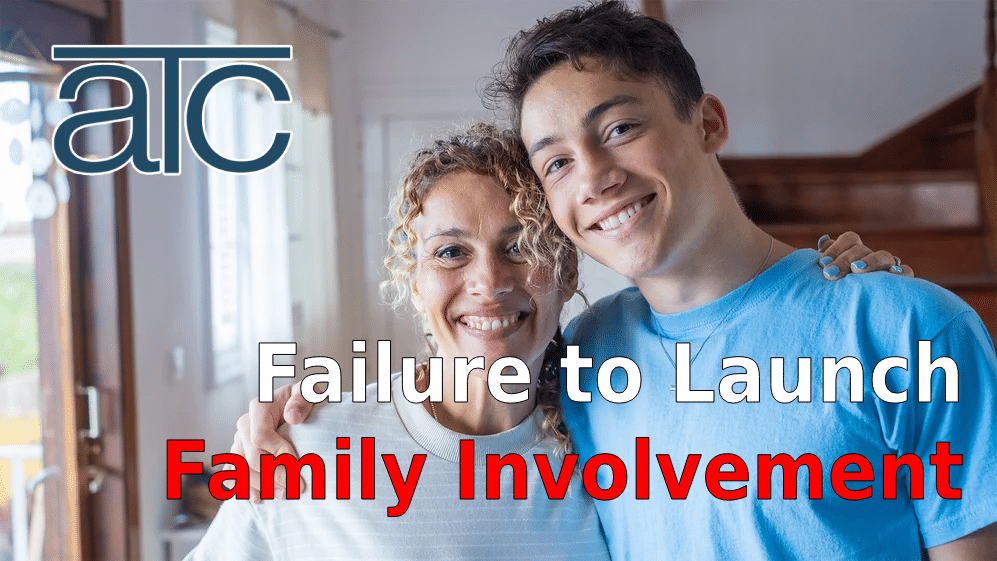Family is key to helping young adults who are stuck. Parents are caught between supporting their kids and pushing them to be independent.
Not launching family involvement creates a strong foundation for success in treatment programs. These programs help young adults build confidence, learn life skills and become independent.
Mental health professionals agree that family support speeds up recovery and growth. Families and professionals can work together to tackle issues like low self esteem, anxiety and poor social skills.
The right amount of support and space helps young adults find their way. Parents learn to set healthy boundaries and show love and care. Want to know how your family can make a difference?
Key Takeaways
- Family support speeds up recovery in failure to launch programs by helping young adults build confidence and life skills. Parents must balance giving help while promoting independence through clear boundaries.
- Regular family meetings, written agreements about house rules and active listening produce better results. Young adults progress faster when parents attend therapy sessions and learn effective communication skills.
- Parents need to move from protective caregivers to supportive coaches. This shift prevents enabling behaviors that block growth and independence.
- Setting limits on financial help and emotional support creates space for growth. Small steps like having young adults manage their own appointments or budget will lead to independence.
- Success is unique to each family. Support groups and family therapy give parents the tools to deal with issues like anxiety, substance abuse or mental health.

Understanding Family Involvement
Family involvement creates a strong support system for young adults who struggle to move forward in life.
Case Example: One family faced challenges with setting boundaries. They scheduled regular family meetings and developed a written agreement.
The Unique Needs of Failure to Launch Families
Parents of emerging adults who have trouble making progress face special challenges. These mothers and fathers often suffer debilitating anxiety, emotional wear and tear and self-doubt about their parenting decisions.
Many have trouble finding the balance between helping out and encouraging self-sufficiency. Their day-to-day lives balance anxiety about their child’s future with practical matters, like boundaries and screen time.
Every household has its own combination of elements. Other parents are managing a child with mental health issues or a substance abuse problem. Others have the challenge of rebuilding trust after previous hostilities.
The majority require assistance with communication skills and boundary-setting tools. They have to learn how to retreat but not withdraw.
The Importance of Family Involvement in Failure to Launch Programs
Impact on Program Outcomes
Family involvement improves outcomes in failure to launch programs. When parents attend therapy sessions on how to properly support their young adult (improving outcomes and rate of progress).
Good boundaries and communication from parents empowers their children to nurture their self-confidence and decision-making abilities.
Rates of success improve when families are engaged in counselling and desired skill-building efforts. Given appropriate family guidance, young adults learn self-care and emotional regulation.
They are taught to navigate conflict, establish goals and work toward autonomy. Setting clear parent-child boundaries end enabling behaviors, which stifle growth.
Clarifying the Failure to Launch Family Role
Families play a vital part in failure to launch programs by creating a support system that promotes growth. Parents must strike a balance between helping their adult children and stepping back to allow independence.
A family therapist guides parents to set clear boundaries while offering emotional support. This balance helps young adults build self-efficacy and learn essential life skills.
Parents need to shift from protective caregivers to supportive coaches in these programs. They must learn to manage their anxieties about their child’s progress while avoiding overprotective parenting patterns.
The focus stays on building resilience and autonomy through positive reinforcement rather than control. Smart communication strategies help families maintain healthy relationships during this transition period.
Strategies for Effective Family Involvement
Communication and Boundary-Setting
Clear talks and firm limits play a huge role in failure to launch programs. Families must learn to balance support with independence through smart communication choices.
- Have regular family meetings to discuss progress and concerns. Everyone gets a voice and a safe space to share feelings.
- Create a written agreement that outlines the house rules and expectations. This contract nips conflict in the bud and builds trust between parents and young adults.
- Practice active listening during tough talks. Parents need to listen to their child’s point of view without trying to fix everything.
- Clarify the rules around money and resources. Parents need to outline what they will and won’t pay for to stop enabling.
- Keep personal space sacred by setting boundaries. Young adults need their own space to develop independence while respecting shared family spaces.
- Use “I” statements to express concerns without blame. This method reduces anger and helps everyone stay calm during hard talks.
- Plan specific times for family activities and alone time. A mix of togetherness and space helps build healthy relationships.
- Set limits on cell phone use during family time. This rule helps create real connections and cuts down on distractions.
- Talk openly about mental health and feelings. Open chats about emotions make it easier to spot warning signs of despair or drug use.
- Make firm rules about substance use in the home. Clear limits on alcohol and marijuana help prevent enabling risky behaviors.
- Build a support network outside the family unit. Individual therapy and support groups give both parents and young adults extra help.
Encouraging Autonomy While Providing Support
Parents play a vital role in helping young adults gain independence. Finding the right balance between support and freedom creates a path to success for emerging adults.
- Set up weekly money talks to boost financial literacy. Show them how to make budgets, pay bills, and save money through hands-on practice.
- Create a step-by-step plan to transfer household duties. Start with basic tasks like laundry and cooking, then move to bigger responsibilities.
- Schedule regular family meetings to discuss progress and challenges. Open communication helps reduce conflict and builds trust between parents and young adults.
- Help them build job skills through mock interviews and resume reviews. Connect them with career counselors who can guide their professional growth.
- Teach healthy ways to handle stress and emotions. Guide them to therapists or support groups that match their needs.
- Set clear house rules with natural results. If they miss rent, they must work extra hours to catch up.
- Give them space to make small mistakes. Learning from wrong choices builds problem-solving skills and confidence.
- Support their social growth without taking control. Let them plan their activities and choose their friends.
- Help them set personal goals and track progress. Break big goals into small, doable steps they can achieve.
- Show them how to find and use community resources. Libraries, job centers, and adult education programs offer free help.
- Practice active listening without fixing every problem. Sometimes they just need someone to hear their struggles.
Interactive Tip: Answer this question in a family meeting: What boundary changes can improve daily routines? Write down observations to review progress.
Challenges and Considerations
Families face tough choices between giving emotional support and avoiding enabling behaviors – read on to learn how to strike the right balance in failure to launch situations.
Balancing Emotional Support and Enabling Behavior
Helping their young-adult children while also stepping back can be difficult for parents to get right. Life coaches remind us that over-attendance can prevent the growth and independence.
Too many parents are paying adult children’s bills, solving their problems, or covering for them. These practices foster chronic dependency and undermine the objectives of failure to launch programs.
Mental health professionals advise transparent boundaries strengthen both parents and young adults. Restricting a financial crutch and emotional support opens up room for growth.
The developmental psychology principles that drive this practice tell us to focus on building skills, not finding solutions. To lead in a way that allows the person to maintain control.
This process triggers deep emotions and separation anxiety on both sides. Adult development experts suggest starting in small ways toward independence, such as asking young adults to make their own appointments or budget.
This way you will minimize some of the conflict resolution challenges between parent/child, adult child/adult child. Nice clear expectations and boundaries also help avoid enabling behaviors that could slow down progress in treatment programs, as well.
Managing Diverse Family Dynamics
Family systems [such as] enabling, dependence, parentification, enmeshment, etc. The dynamics of family contribute significantly to failure to launch situations. Each family has its own blend of parenting styles, attachment patterns and behavioral health issues to bring to the table.
These various elements influence the way in which young adults engage with their support systems and address treatment plans.
The difference is how well programs are responsive to each family’s needs,” said Barbara Duffield, executive director of the support organization, SchoolHouse Connection. Giving them boundaries minimizes negative reinforcement and stops enabling.
Family therapists help parents and young adults tackle difficult conversations around trauma, risks and expectations. The goal remains simple forge new relationships while assisting young adults in transitioning to independence.
Best Practices and Recommendations
Best practices focus on practical steps for families to support their emerging adults, including setting clear boundaries, creating structured routines, and building life skills – grab our free guide to learn more!
Actionable Tips for Failure to Launch Families
Families play a vital role in helping young adults move toward independence. These practical tips will help parents support their emerging adults while promoting growth and autonomy.
- Have weekly family meetings to discuss progress and concerns with your teenager.
- Create a step by step plan with your adolescent that includes small goals for work, education or life skills.
- Learn to spot the difference between helpful support and enabling behaviour through family therapy sessions.
- Practice active listening when talking to your child about their mind and attitudes towards independence.
- Find a network of other parents going through the same journey through local support groups.
- Set a realistic timeline for your emerging adult to take on more financial responsibilities.
- Work with a developmental psychologist to understand normal milestones of young adulthood.
- Create a written agreement that outlines house rules, expectations and consequences.
- Be consistent with boundaries while showing emotional support through regular check ins.
- Have your young adult create a monthly budget and stick to it.
- Connect with local resources like job training programs or counseling services.
- Take care of your own emotional health through self care and support groups.
- Use a shared digital calendar or app for appointments and goals.
- Break down big goals into smaller tasks your teenager can achieve.
- Stay up to date with research on emerging adulthood through reputable sources.
Resources and Further Reading
The online library of the National Institute on Drug Abuse can help parents and caregivers. This free resource provides research papers and guides on developments in teenage growth and mental health.
Support groups in local areas also offer families an opportunity to meet others dealing with similar challenges.
Clear-writing books on the science of young adult life abound from expert Jeffrey Arnett. His work allows parents to understand the typical ebbs and flows of this developmental phase.
These resources offer practical advice on being helpful to your teen without supporting unhealthy patterns.
Reach out to ATC today to learn more about our proven family-centered approach to helping young adults thrive.

The Next Steps
Family support creates a strong foundation for young adults who struggle to move forward in life. Active family involvement helps build healthy boundaries, clear communication, and proper emotional support.
Success rates soar when families learn to balance support without enabling negative behaviors. Program leaders and families must work together to create paths that lead to growth and independence.

Recent Comments